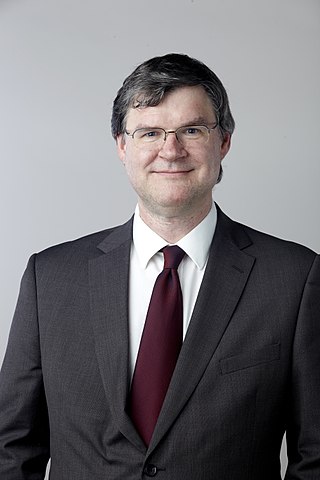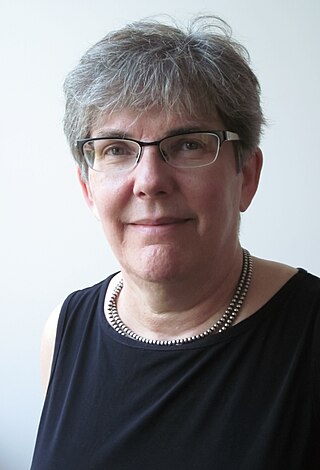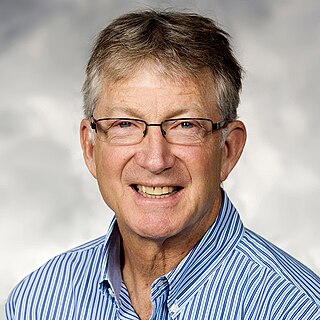
Michael I. Posner is an American psychologist who is a researcher in the field of attention, and the editor of numerous cognitive and neuroscience compilations. He is emeritus professor of psychology at the University of Oregon, and an adjunct professor at the Weill Medical College in New York. A Review of General Psychology survey, published in 2002, ranked Posner as the 56th most cited psychologist of the 20th century.

Kristina M. Johnson is an American business executive and academic administrator.
Brian Hilton Flowers, Baron Flowers FRS was a British physicist, academician, and public servant.

Jennifer Tour Chayes is dean of the college of computing, data science, and society at the University of California, Berkeley. Before joining Berkeley, she was a technical fellow and managing director of Microsoft Research New England in Cambridge, Massachusetts, which she founded in 2008, and Microsoft Research New York City, which she founded in 2012.

David George Charlton is Professor of Particle Physics in the School of Physics and Astronomy at the University of Birmingham, UK. From 2013 to 2017, he served as Spokesperson of the ATLAS experiment at the Large Hadron Collider at CERN. Prior to becoming Spokesperson, he was Deputy Spokesperson for four years, and before that Physics Coordinator of ATLAS in the run-up to the start of collision data-taking.

Tanya Mary Monro is an Australian physicist known for her work in photonics. She has been Australia's Chief Defence Scientist since 8 March 2019. Prior to that she was the Deputy Vice Chancellor, Research and Innovation (DVCR&I) at the University of South Australia. She was awarded the ARC Georgina Sweet Australian Laureate Fellowship in 2013. She was the inaugural chair of photonics, the inaugural director of the ARC Centre of Excellence for Nanoscale Biophotonics and the inaugural director of the Institute for Photonics & Advanced Sensing (IPAS), and the inaugural director of the Centre of Expertise in Photonics (CoEP) within the School of Chemistry and Physics at the University of Adelaide. Monro has remained an adjunct professor of physics at the University of Adelaide following her departure from the institution. In 2020 she was awarded the title of Emeritus Professor at the University of South Australia.
Susan Lesley "Sue" Mendus,, FLSW is a Welsh academic specialising in political philosophy. She is currently Professor Emerita of Political Philosophy at the University of York. She was Vice-President of the British Academy between 2008 and 2012.
Robert Harry Socolow is an American theoretical physicist and professor emeritus of Mechanical and Aerospace Engineering at Princeton University.
Ralph A. Griffiths OBE DLitt FRHistS FLSW is a historian and an emeritus professor at Swansea University.
Bryan Ronald Webber, FRS, FInstP is a British physicist and academic. He was a Fellow of Emmanuel College, Cambridge from 1973 to 2010, and Professor of Theoretical Physics at the University of Cambridge from 1999 to 2010. He has been awarded the Dirac Medal by the Institute of Physics, the Sakurai Prize by the American Physical Society and the High Energy and Particle Physics Prize by the European Physical Society.

Heidi Marie Schellman is an American particle physicist at Oregon State University (OSU), where she heads the Department of Physics. She is an expert in Quantum chromodynamics.

Paul Joseph Boyle,, FRSGS, FLSW is a British geographer, academic, and academic administrator. He was the Vice-Chancellor of the University of Leicester between 2014 and 2019. He had been Professor of Human Geography at the University of St Andrews from 1999 to 2014, and Chief Executive of the Economic and Social Research Council (ESRC) from 2010 to 2014. He took over as Vice-Chancellor of Swansea University at the end of the 2018/2019 academic year.
Sir Robert Hughes Williams,, commonly known as Robin Williams, is a Welsh physicist and academic, specialising in solid state physics and semiconductors. He was Vice-Chancellor of University of Wales, Swansea from 1994 to 2003. He had taught at the New University of Ulster and University of Wales, College of Cardiff, before joining Swansea.

James L. Skinner is an American theoretical chemist. He is the Joseph O. and Elizabeth S. Hirschfelder Professor Emeritus at the University Wisconsin-Madison. He is also a member of the Scientific Advisory Board of the Welch Foundation. Most recently, Skinner was the Crown Family Professor of Molecular Engineering, professor of chemistry, director of the Water Research Initiative and deputy dean for faculty affairs of the Pritzker School of Molecular Engineering at the University of Chicago. Skinner is recognized for his contributions to the fields of theoretical chemistry, nonequilibrium statistical mechanics, linear and nonlinear spectroscopy of liquids, amorphous and crystalline solids, surfaces, proteins, and supercritical fluids. Skinner is the co-author of over 230 peer-reviewed research articles.
Dewi Meirion Lewis is a Welsh physicist. He has worked in nuclear research and is an internationally recognized expert in radioactive pharmaceuticals.
George H. Trilling was a Polish-born American particle physicist. He was co-discoverer of the J/ψ meson which evinced the existence of the charm quark. Trilling joined the Physics Department faculty at the University of California, Berkeley, in 1960, where he was Department Chair from 1968 through 1972. Trilling was on sabbatical leave to CERN in 1973–74, where he worked on the study of the properties of charm particles, their decay modes and excited states. He was also Director of the Physics Division at the Lawrence Berkeley National Laboratory from 1984 until 1987. Trilling was a principal proponent of the Superconducting Super Collider project and spokesperson for the Solenoidal Detector Collaboration. After the SSC was cancelled in 1993, Trilling transitioned most of the SDC team to collaborate on the ATLAS experiment at the LHC, which led to the discovery of the Higgs boson in 2012. Trilling was elected Vice-President of the American Physical Society, beginning his term on 1 January 1999, and was President of the society in 2001.
John M. Pearce is an Emeritus Professor of Psychology at Cardiff University, with expertise in experimental psychology and behavioural neuroscience.
Hywel Rhys Thomas CBE FREng FRS FLSW MAE is the current President of the Learned Society of Wales. He also works as an academic, currently serving as Professor of Civil Engineering and Founder Director of the Geoenvironmental Research Centre at Cardiff University.
Helen Fulton FRSA FSA FLSW is a Professor of Medieval Literature at Bristol University.







